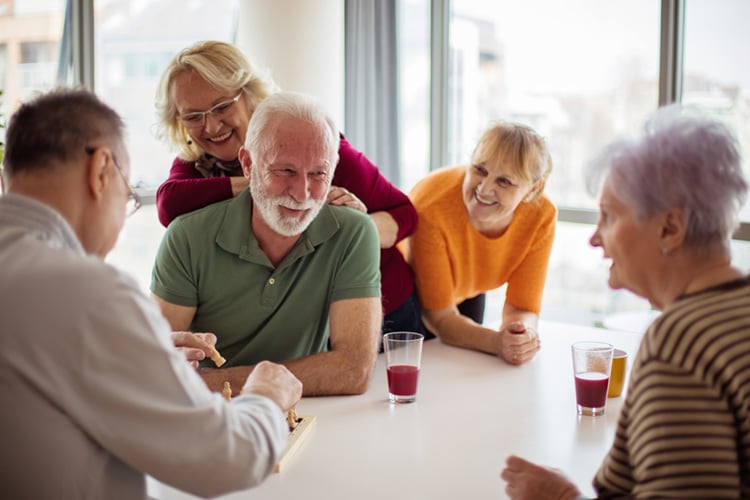
Three Keys to Maintaining Mental Health and Well-Being at Presbyterian Senior Living
Health & Aging | Presbyterian Senior Living | Miscellaneous
Prioritizing mental health and well-being is necessary for seniors to maintain a fulfilling and happy life. In recognition of the recent World Mental Health Day on October 10, Nancy Pilkington, MSW, LSW, Presbyterian Senior Living Corporate Director of Resident Services, shares three keys to mental health and well-being for seniors:
1. Personal connection
One of the most effective ways to support mental well-being is to maintain social connections, Nancy says. Loneliness and isolation can lead to feelings of depression and anxiety. Stay connected with friends, family, and your community. Engage in social activities, join clubs or groups that share your interests, and make an effort to spend time with loved ones regularly. Social interaction can provide emotional support and combat feelings of loneliness.
2. Physical activity
Regular exercise benefits mental health in numerous ways. Engaging in physical activity releases endorphins, which are natural mood lifters. Exercise also can improve cognitive function, reduce stress, and enhance overall well-being. Even light exercise such as walking, swimming, or yoga can have a positive impact on mental health.
3. Mindfulness and stress management
As individuals age, managing stress becomes increasingly important. Practices such as mindfulness meditation, deep-breathing exercises, or yoga can help reduce stress and promote emotional well-being. These techniques can improve the ability to cope with life's challenges, reduce anxiety, and promote a sense of calm and inner peace.
In addition to these three key practices, it’s important to maintain a healthy lifestyle by eating a balanced diet, getting adequate sleep, and seeking professional help if you experience symptoms of depression or anxiety.

Mental illnesses are common, affecting one in five Americans regardless of age, race, gender, religion or income. “Mental health should be an essential part of your self-care routine, just like maintaining a healthy diet or getting enough sleep,” Nancy says.
Getting beyond the stigma
Nancy began working at PSL more than a decade ago as Resident Services Coordinator at Westminster Place in Stewartstown, Pennsylvania. Over the years, her responsibilities have evolved, but her commitment to improving the lives of older adults has remained steadfast.
Throughout her time at PSL, Nancy repeatedly has witnessed the stigma that can come with mental health struggles.
“So many older adults are hesitant to talk about mental health,” she says. “We need to shed light on World Mental Health Day to let people know it’s OK to discuss it. Seniors often prioritize their physical health, but mental health doesn't receive the same attention. There’s a stigma attached to talking about mental health, and people are less likely to ask for help. We need to change that.”
At PSL, supporting mental and emotional well-being is an integral part of its mission. Under the Thrive Wellness program, residents have access to a range of resources aimed at promoting emotional wellness and mental health. Progress in destigmatizing mental health discussions is gradual but crucial.
“It's a slow process because of the stigma attached to talking about emotions,” Nancy says, “but we must keep the lines of communication open. Good mental health allows us to enjoy life and stay connected to our community.”

Resources for PSL residents
At any time, PSL residents can access the Connected Living platform, which provides residents with information on mental well-being.
“We offer resources like breathing techniques to reduce stress and articles emphasizing the importance of mental health at any age,” Nancy says.
In recognition of October's Active Aging Week, PSL is hosting Connect to Thrive. This company-wide initiative includes activities addressing emotional wellness and mental health.
PSL residents and staff also engage in educational activities focused on mental health. They have taken part in programs such as Make It OK, QPR (Question, Persuade, and Refer), and the Community Resiliency Model developed by the Trauma Resource Institute. These programs equip individuals with valuable tools to understand and manage their mental health.
“Know where your resources are and how to access them,” Nancy advises. “Mental illnesses are treatable, medical conditions yet people are still not comfortable talking about mental illness and delay seeking treatment or support.
“World Mental Health Day is a global call to action and advocacy. I hope people take away the importance of considering their own mental health, supporting others in their mental health journey, and being empathetic during challenging times.”
About Presbyterian Senior Living
As the trusted leader in aging services, Presbyterian Senior Living combines over 95 years of experience with innovative approaches to senior communities and services. Across our 27 communities in PA, MD, OH, and DE, we serve over 6,500 seniors. We are committed to: FOSTERING teamwork and responsibility. UPHOLDING integrity in every action. EMBRACING innovation to create opportunities for everyone’s success. LEADING with compassion and respect.


